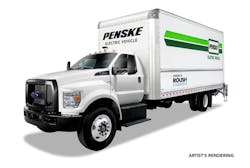ROUSH CleanTech deploys Class 6 BEVs
ROUSH CleanTech, known for its clean transportation solutions, is providing Penske Truck Leasing with all-new Ford F-650 battery electric vehicles later this year for deployment across Southern California.
“Penske has been expanding its battery electric fleet for the past several years,” said Paul Rosa, senior vice president of procurement and fleet planning at Penske Truck Leasing. “We are working with our customers to evaluate ROUSH CleanTech-powered BEVs across various real-world applications.”
The BEVs were built to Penske’s specifications to ensure a satisfactory experience across many market segments.
ROUSH CleanTech is backed by decades of electric vehicle engineering capability from parent company, Roush Enterprises. Roush’s expertise in electrification, partnering with companies like Canoo and FarmWise, includes production design, functional performance validation, compliance testing, assembly set up, and vehicle second-stage manufacturing.
The demonstration units were funded in part by the South Coast Air Quality Management District (AQMD), the regulatory agency focused on improving air quality for large areas of Los Angeles, Orange, Riverside, and San Bernardino counties.
“Our work with Roush has played a major role in the development and commercialization of clean air technologies,” said Wayne Nastri, executive officer for South Coast AQMD.
“Over the past decade, ROUSH CleanTech has put more than 37,000 vehicles on North American roads,” said Todd Mouw, president of ROUSH CleanTech. “We bring that experience and expertise to the battery electric vehicle market and to partnerships like South Coast Air Quality District and Penske to deliver solutions for a sustainable future.”
ROUSH CleanTech’s battery electric vehicles:
- Have a maximum speed of 65 mph and a 100-mile range.
- Reduce operating costs for customers, the company says.
- Foster healthier communities by emitting no exhaust and zero emissions of nitrogen oxides, carbon monoxide, particulate matter, volatile organic compounds, and hydrocarbons.
- Meet all Department of Transportation regulations, comply with all applicable vehicle Federal Motor Vehicle Safety Specifications (FMVSS) requirements, and adhere to the California Zero Emissions Powertrain certification program.
ROUSH CleanTech was the first company to offer a near-zero, 0.02g g/bhp-hr propane autogas engine certified by the California Air Resources Board, according to the company. According to the Environmental Protection Agency, operating vehicles with ultra-low or zero-emission engines make significant improvements to regional air quality and reduce a wide variety of human health impacts.
Production starts in summer of 2021.
